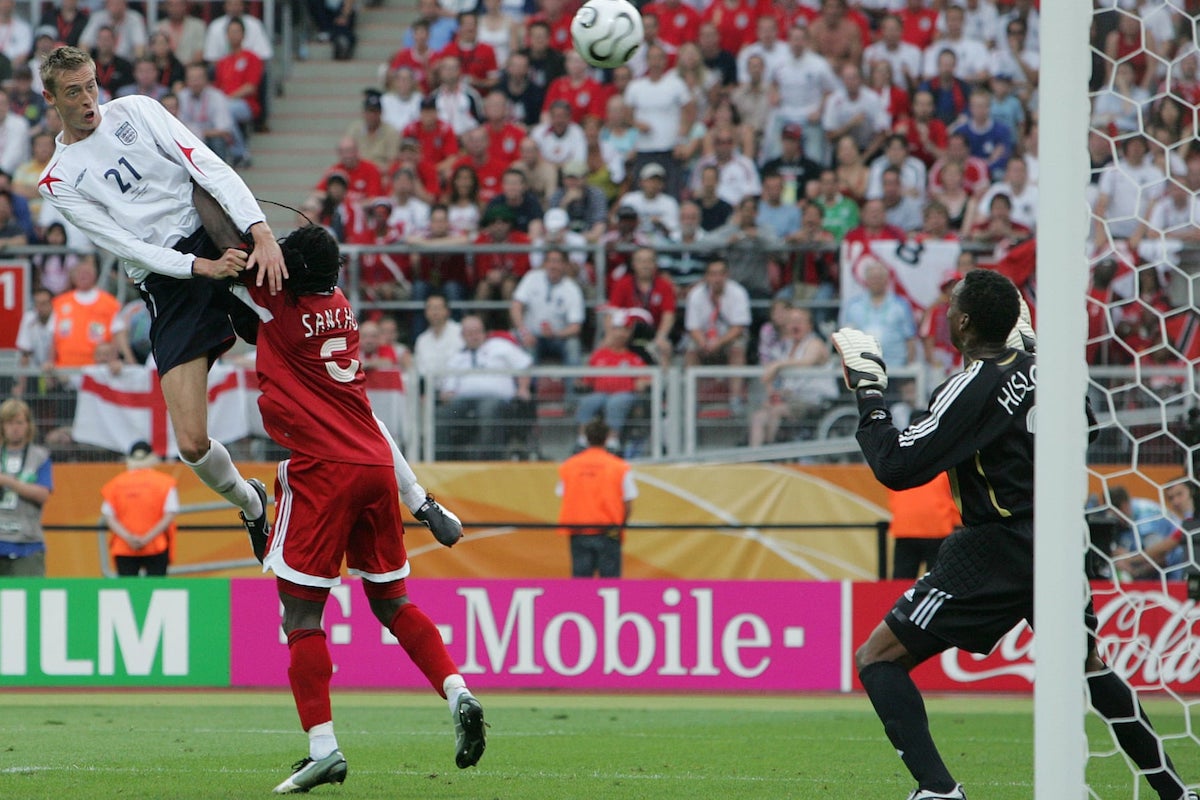A globetrotting playing career took Brent Sancho from Portland to Priestfield, Ross County to Rochester Rhinos but, speaking to the former Trinidad and Tobago defender, there really is only one place to start: that unforgettable night in Nuremberg at the 2006 World Cup.
For 82 minutes Sancho and Dennis Lawrence, now the manager of the Caribbean nation, had held firm against Sven-Göran Eriksson’s England, until Peter Crouch pulled on Sancho’s dreadlocks for leverage and headed beyond Shaka Hislop. Steven Gerrard sealed victory in stoppage time, by which point Crouch had established himself as public enemy No 1.
“It was bodily assault,” Sancho says, laughing. “Becks hanged up the cross and I saw him [Crouch] so I tried to back into him so he couldn’t jump. But he used my hair, my shoulder and every other part of my body to get over me. I was laid on the ground, looking at the referee amazed he did not give a foul and he gave me that look as if to say: ‘Listen, buddy. There’s no chance I’m going to give that call here. You’re tiny Trinidad against mighty England.’”
It was a laboured England performance. Sancho rows back to the moment when Wayne Rooney was introduced off the bench to help stir the team. “Eriksson was a very cool customer, but you could hear the panic in his voice when he was giving instructions,” Sancho recalls. “I didn’t feel they could beat us. You could sense their concern and they were worried. We were very aware of the enormity of playing against Lampard, Stevie Gerrard and those guys, but we were confident we could compete. We were over the moon to make our tiny country so proud.”
After going close to reaching the 1974 and 1990 tournaments, Trinidad became the smallest nation to qualify for a World Cup, until Iceland superseded them last year. Sancho says it was “arguably the biggest occasion” in the country’s history. As archetypal underdogs, Trinidad were sometimes ridiculed. Sancho recalls a question by an English journalist before they blunted Sweden’s front two of Zlatan Ibrahimovic and Henrik Larsson in a 0-0 draw in their Group B opener. Sancho was watching the press conference at the hotel with some teammates.
“They said: ‘Seeing as cricket is a popular sport in Trinidad, do you expect to lose by a cricket score?’ I remember going back on the bus after, and the then prime minister [Patrick Manning] called us on speakerphone to congratulate us. You could hear all the pandemonium behind him, all the cabinet ministers celebrating.”
England eventually came unstuck in the quarter-finals against Portugal on penalties, prompting an inquest into their shortcomings from 12 yards. Trinidad, meanwhile, had a host of off-field issues to resolve. The now disgraced former Fifa vice-president Jack Warner ended up in a bitter dispute with the players over bonuses. It proved the start of what Sancho describes as “the changing of the guard” as the administrative side underwent transition.
Lawrence takes the next generation to one of his former clubs, Wrexham, on Wednesday when Wales entertain Trinidad in a friendly at the Racecourse Ground. “When you talked about Wales 20 years ago, you would really just be talking about Ryan Giggs,” Sancho says. “Now it’s a well-rounded team with a group of young, talented players that play for some of the top clubs in Europe. I will be very surprised if they do not qualify for a World Cup very, very soon.”
The majority of the Trinidad squad play in their homeland, the United States or Saudi Arabia. None are UK-based. “Credit should go to Dennis because he’s been able to chisel the team into an army that is moving in one direction,” Sancho says. “They have had one or two decent results, they have played a lot better and look a lot more organised. They are a team that, on their day, can be very tough to play against. Over the past months they have put together some really decent performances.”
These days Sancho, who had a stint as Trinidad’s minister of sport from 2015 under the previous government, runs his own professional club, Central FC, in the small town of California. He appointed the country’s all-time leading goalscorer, Stern John, who did his Uefa B licence in Wales, as manager in 2016 – “he really has got the bit between his teeth”. Sancho, who played under the Cardiff first-team coach Ronnie Jepson at Gillingham, has held discussions with Ken Choo, the Welsh club’s chief executive, about the possibility of becoming a feeder club. In terms of Trinidad, Kenwyne Jones is back on the island and has been added to the national coaching pool. Hislop and Dwight Yorke also help out intermittently, while others from that class of 2006, including Carlos Edwards and Jason Scotland, who left an Under-18s role at Hamilton in January, have gained coaching badges.
As for Crouch, Sancho bumped into him 12 months on from that tug-of-war. “I went to the player of the year awards in London in 2007. I walked up to him and said: ‘Do you know that you cannot come to Trinidad? They absolutely hate you.’ He just started laughing and walked on. England came to Trinidad in 2008 and he did not get a good reception at all. He was a very hated man.”
SOURCE: The Guardian

